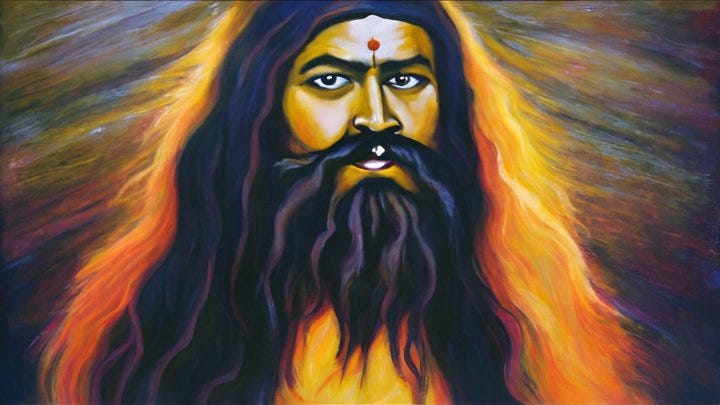Patanjali and his Sutras: The Birth of Mind Science
The Ancient Indian Sage Who Gave Us The Blueprint for Consciously Living...
Patanjali, an ancient Indian sage and scholar, is the father of the Yoga Sutras, a text that has influenced the practice and study of yoga, meditation, and conscious living for thousands of years. The Yoga Sutras is a collection of 196 aphorisms that provide guidance on how to live a conscious and fulfilled life.
Patanjali's work is considered the first collated "mind science" in human history, as it provides a comprehensive and systematic approach to understanding the nature of the mind and its role in human experience. In this article, we will explore the life and teachings of Patanjali, his methods for being consciously aware, and the influence of his work on modern times.
Who Was Patanjali?
Patanjali is believed to have lived in India during the 2nd century BCE. He was a scholar and teacher who is credited with the compilation of the Yoga Sutras, a seminal text in the study and practice of yoga. Patanjali's life is shrouded in mystery, and little is known about his personal life. However, his teachings and writings have had a profound impact on the spiritual and philosophical traditions of India and beyond.
The Yoga Sutras: The Birth of Mind Science
The Yoga Sutras is a collection of aphorisms that provide guidance on how to live a conscious and fulfilled life. The text is divided into four chapters, each of which explores a different aspect of the mind and its role in human experience.
Patanjali's teachings are based on the concept of "chitta," which refers to the mind, intellect, and consciousness. According to Patanjali, the mind is the root cause of all human suffering, but it is also the key to liberation and enlightenment.
The first chapter of the Yoga Sutras focuses on Samadhi, or the state of meditation. Patanjali outlines various methods for achieving this state of consciousness, including concentration, contemplation, and absorption. He also emphasizes the importance of self-discipline, devotion, and detachment in achieving Samadhi.
The second chapter explores the nature of the mind and its relationship to the external world. Patanjali emphasizes the importance of cultivating a clear and focused mind in order to understand the true nature of reality. He also discusses the concept of "samskaras," or the mental impressions that shape our perceptions and experiences.
The third chapter explores the concept of mystical powers or "siddhis," which can be achieved through the practice of yoga. Patanjali warns against becoming attached to these powers and emphasizes the importance of using them for the benefit of all beings.
The fourth and final chapter of the Yoga Sutras explores the nature of enlightenment or "kaivalya." Patanjali emphasizes the importance of self-realization and the attainment of liberation from the cycle of birth and death.
Is Patanjali Still Relevant Today?
Patanjali's teachings have had a profound influence on the spiritual and philosophical traditions of India and beyond. His work has been studied and practiced for thousands of years, and it continues to inspire and guide people around the world. In recent years, there has been a resurgence of interest in Patanjali's teachings, as people seek to find meaning and purpose in their lives.
According to Dr. David Frawley, a prominent scholar of Indian philosophy, "The Yoga Sutras of Patanjali is one of the most important texts of the Hindu tradition, and one of the greatest works of spiritual and philosophical insight ever composed." (1) Frawley notes that Patanjali's teachings are relevant not only to those who practice yoga and meditation, but to anyone seeking to live a conscious and fulfilled life.
The teachings of Patanjali have also influenced the development of modern psychology and neuroscience. Dr. Richard Miller, a clinical psychologist and yoga teacher, notes that Patanjali's work "is a seminal text in the understanding of consciousness and the exploration of the human mind." (2) Miller points out that Patanjali's approach to understanding the mind is highly relevant to modern research on the brain and consciousness.
Patanjali's teachings on mindfulness and self-awareness have also been embraced by the mindfulness movement, which has gained popularity in recent years. Mindfulness practices, which involve cultivating non-judgmental awareness of the present moment, are based on the principles of Patanjali's teachings.
In conclusion, Patanjali's Yoga Sutras provide a comprehensive and systematic approach to understanding the nature of the mind and its role in human experience. His teachings have had a profound influence on the spiritual and philosophical traditions of India and beyond, as well as on modern psychology and neuroscience. Patanjali's work remains highly relevant today, as people continue to seek guidance on how to live a conscious and fulfilled life.
References:
Frawley, D. (2000). Yoga and the Sacred Fire: Self-Realization and Planetary Transformation. Motilal Banarsidass.
Miller, R. (2008). Yoga Nidra: A Meditative Practice for Deep Relaxation and Healing. Sounds True.



You know I'd never ever heard of Patanjali before so thanks for enlightening us. I'll have to read up on him. One wonders how many great men and women from antiquity who were well known as great sages/philsophers during their lifetimes are now unknown to us due to their works not surviving the passage of time? A great many I daresay. Hopefully though some more ancient scrolls or tablets will come to light during archaeological digs.
Ancient India was a land famed for the wisdom of its inhabitants, even Alexander the Great wanted to seek out its philosopher's to have discourse with. Though I feel that the pre Vedic Harrappan Civilisation has way more mysteries but we just need to be able to translate their language which unlike ancient Egyptian had no rosetta stone tablet hence no breakthrough yet, if it happens though there's thousands of clay tablets waiting to be translated and who knows what we'll learn.